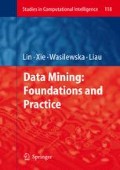Summary
The essential problem of Knowledge Discovery in Databases is to find interesting relationships, those that are meaningful in a domain. This task may be viewed as one of searching an immense space of possible actionable concepts and relations. Because the classical knowledge discovery algorithms are not able to determine if a pattern is truly actionable for a user, we focus on a new class of action rules, called e-action rules that can be used not only for automatically analyzing discovered patterns but also for reclassifying some objects in the data from one state into another more desired state. For a quicker and more effective process of e-action rules discovery, action tree algorithm is presented. Support and confidence of the rules are proposed to prune a large number of irrelevant, spurious, and insignificant generated candidates. The algorithm is implemented as DEAR_2.2 system and it is tested on several public domain databases. The results show that actionability can be considered as a partially objective measure rather than a purely subjective one. E-Action rules are useful in many fields such as medical diagnosis and business.
Access this chapter
Tax calculation will be finalised at checkout
Purchases are for personal use only
Preview
Unable to display preview. Download preview PDF.
References
Adomavicius G, Tuzhilin A (1997) Discovery of actionable patterns in databases: the action hierarchy approach. In: Proceedings of KDD97 Conference, AAAI, Newport Beach, CA
Chmielewski M R, Grzymala-Busse J W, Peterson N W, Than S (1993) The rule induction system LERS – a version for personal computers. In: Foundations of Computing and Decision Sciences. Vol. 18, No. 3–4, Institute of Computing Science, Technical University of Poznan, Poland: 181–212
Geffner H, Wainer J (1998) Modeling action, knowledge and control. In: ECAI 98, Proceedings of the 13th European Conference on AI, (Ed. H. Prade), Wiley, New York, 532–536
Grzymala-Busse J (1997) A new version of the rule induction system LERS. In: Fundamenta Informaticae, Vol. 31, No. 1, 27–39
Liu B, Hsu W, Chen S (1997) Using general impressions to analyze discovered classification rules. In: Proceedings of KDD97 Conference, AAAI, Newport Beach, CA
Pawlak Z (1991) Rough sets-theoretical aspects of reasoning about data. Kluwer, Dordrecht
Pawlak Z (1981) Information systems – theoretical foundations. In: Information Systems Journal, Vol. 6, 205–218
Polkowski L, Skowron A (1998) Rough sets in knowledge discovery. In: Studies in Fuzziness and Soft Computing, Physica-Verlag/Springer, Berlin Heidelberg New York
Raś Z, Wieczorkowska A (2000) Action rules: how to increase profit of a company. In: Principles of Data Mining and Knowledge Discovery, (Eds. D.A. Zighed, J. Komorowski, J. Zytkow), Proceedings of PKDD ’00, Lyon, France, LNCS/LNAI, No. 1910, Springer, Berlin Heidelberg New York, 587–592
Raś Z W, Tsay L-S (2003) Discovering extended action-rules (System DEAR). In: Intelligent Information Systems 2003, Proceedings of the IIS’2003 Symposium, Zakopane, Poland, Advances in Soft Computing, Springer, Berlin Heidelberg New York, 293–300
Silberschatz A, Tuzhilin A (1995) On subjective measures of interestingness in knowledge discovery. In: Proceedings of KDD9́5 Conference, AAAI, Newport Beach, CA
Silberschatz A, Tuzhilin A (1996) What makes patterns interesting in knowledge discovery systems. In: IEEE Transactions on Knowledge and Data Engineering, Vol. 5, No. 6
Tsay L-S, Raś Z W (2006) E-Action Rules. In: Post-Proceeding of FDM’04 Workshop Advances in soft Computing, Springer, Berlin Heidelberg New York
Author information
Authors and Affiliations
Editor information
Editors and Affiliations
Rights and permissions
Copyright information
© 2008 Springer-Verlag Berlin Heidelberg
About this chapter
Cite this chapter
Raś, Z.W., Tsay, LS. (2008). Mining E-Action Rules, System DEAR. In: Lin, T.Y., Xie, Y., Wasilewska, A., Liau, CJ. (eds) Data Mining: Foundations and Practice. Studies in Computational Intelligence, vol 118. Springer, Berlin, Heidelberg. https://doi.org/10.1007/978-3-540-78488-3_17
Download citation
DOI: https://doi.org/10.1007/978-3-540-78488-3_17
Publisher Name: Springer, Berlin, Heidelberg
Print ISBN: 978-3-540-78487-6
Online ISBN: 978-3-540-78488-3
eBook Packages: EngineeringEngineering (R0)

